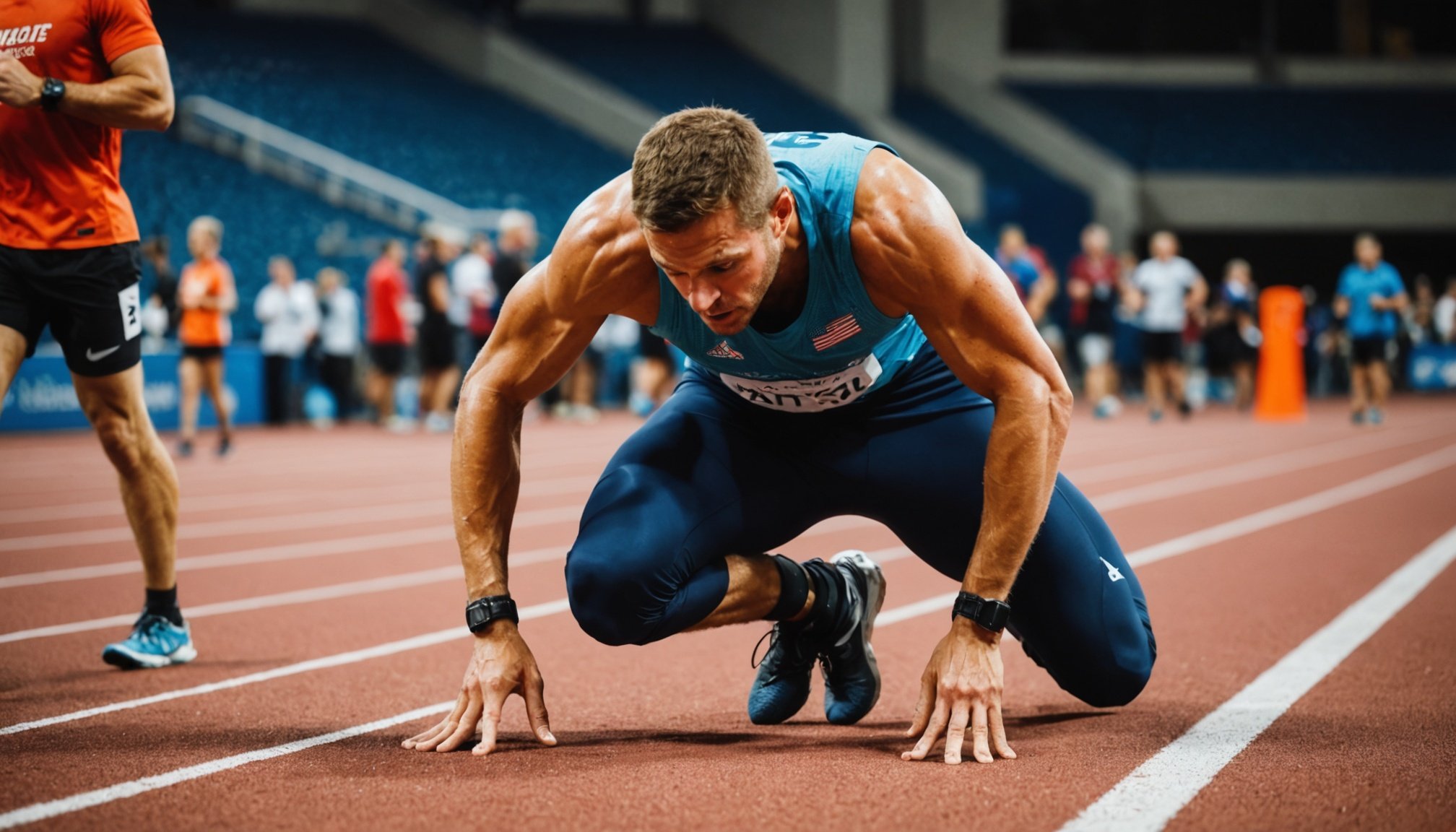Top Strategies to Combat Athlete Fatigue During Multi-Day Competitions
When athletes participate in multi-day competitions, managing fatigue is crucial to maintain performance and avoid injuries. Here are some top strategies to help athletes combat fatigue and optimize their performance.
Understanding Athlete Fatigue
Athlete fatigue is a complex phenomenon that can be both physical and mental. It is often the result of prolonged physical activity, inadequate recovery, and other factors such as sleep deprivation, nutritional deficiencies, and psychological stress.
Also read : Unlocking Peak Performance: The Advantages of Adding Yoga to Your Wrestling Training Routine
Physical Fatigue
Physical fatigue is the most obvious type and is characterized by a decrease in physical performance. This can be due to the accumulation of metabolic by-products, muscle damage, and depletion of energy stores. For endurance athletes, this might manifest as a reduction in speed, strength, and endurance over the course of the competition[1].
Mental Fatigue
Mental fatigue, on the other hand, affects an athlete’s cognitive functions and motivation. It can lead to decreased focus, reduced reaction times, and a general feeling of exhaustion. Mental fatigue can be just as debilitating as physical fatigue and often interacts with it to exacerbate the overall feeling of tiredness.
Also to see : Unlocking Performance: The Advantages of Altitude Training Masks for Sprinters
Training and Recovery Strategies
Effective training and recovery strategies are key to managing fatigue during multi-day competitions.
Periodized Training
Periodized training involves varying the intensity and volume of training over time to allow for periods of recovery and adaptation. This approach helps in building resilience and reducing the risk of overtraining syndrome.
| **Training Phase** | **Description** | **Recovery Focus** |
|
|------------------|
|
| **Base Training** | High volume, low intensity | Active recovery, foam rolling |
| **Build Phase** | Increasing intensity and volume | Emphasis on sleep, nutrition |
| **Taper Phase** | Reduction in training load | Passive recovery, mental relaxation |
Active Recovery
Active recovery involves light physical activity to promote blood flow and aid in the removal of metabolic by-products. Examples include light jogging, cycling, or swimming. This type of recovery can help in reducing muscle soreness and improving overall fitness.
- **Light Cardio**: 20-30 minutes of low-intensity cardio
- **Stretching and Foam Rolling**: Focus on major muscle groups
- **Hydration and Nutrition**: Adequate fluid and nutrient intake
Sleep Management
Sleep is a critical component of recovery and athletic performance. During multi-day competitions, ensuring adequate sleep is essential.
Sleep Strategies
- Consistent Sleep Schedule: Maintain a regular sleep schedule even during competitions.
- Sleep Environment: Optimize the sleep environment to ensure it is dark, quiet, and cool.
- Avoid Stimulants: Avoid caffeine, alcohol, and electronic screens before bedtime.
| **Sleep Stage** | **Duration** | **Importance** |
|
|--------------|
|
| **Stage 1 NREM** | 5-10 minutes | Transition to sleep |
| **Stage 2 NREM** | 20 minutes | Body temperature drops |
| **Stage 3 NREM** | 20-30 minutes | Deep sleep, muscle repair |
| **REM Sleep** | 90-120 minutes | Brain recovery, memory consolidation |
Nutrition and Hydration
Proper nutrition and hydration are vital for maintaining energy levels and supporting recovery.
Nutritional Strategies
- Carbohydrate Loading: Increase carbohydrate intake before and during the competition to maintain energy stores.
- Protein Intake: Ensure adequate protein to support muscle repair and recovery.
- Hydration: Drink water and electrolyte-rich fluids to stay hydrated.
- **Pre-Competition Meal**: Balanced meal with complex carbohydrates, protein, and healthy fats
- **During Competition**: Snacks rich in carbohydrates and electrolytes
- **Post-Competition**: Meal with protein and carbohydrates to aid in recovery
Mental Preparation and Stress Management
Mental fatigue can be as debilitating as physical fatigue. Here are some strategies to manage mental stress.
Mental Preparation
- Visualization: Visualize success and positive outcomes to boost confidence.
- Positive Self-Talk: Use positive affirmations to maintain motivation.
- Relaxation Techniques: Practice techniques like deep breathing, meditation, or yoga to reduce stress.
- **Pre-Competition Routine**: Establish a consistent pre-competition routine to reduce anxiety
- **Focus on the Present**: Concentrate on the current task rather than worrying about the outcome
- **Support Network**: Surround yourself with a supportive team and family
Monitoring and Adjusting Training Load
Monitoring the training load and adjusting it accordingly is crucial to avoid overtraining.
Heart Rate Monitoring
Using heart rate monitors can help in tracking the body’s response to training. An elevated resting heart rate can indicate fatigue and the need for recovery.
| **Heart Rate Zone** | **Intensity** | **Purpose** |
|
|---------------|
|
| **Zone 1** | Low | Active recovery |
| **Zone 2** | Moderate | Endurance training |
| **Zone 3** | High | Strength and power training |
| **Zone 4** | Very High | High-intensity interval training |
Practical Insights and Actionable Advice
Here are some practical tips and advice for athletes to combat fatigue during multi-day competitions:
Tapering Before Competition
Reducing the training load before a competition, known as tapering, allows the body to recover and adapt. This can involve a 20-50% reduction in training volume while maintaining intensity.
- **During Taper**: Focus on active recovery and mental relaxation
- **Nutrition**: Maintain a balanced diet with an emphasis on carbohydrates and protein
- **Sleep**: Ensure 7-9 hours of sleep each night
Using Recovery Tools
Tools like foam rollers, compression garments, and ice baths can aid in recovery by reducing muscle soreness and improving circulation.
- **Foam Rolling**: Focus on major muscle groups like the legs, back, and shoulders
- **Compression Garments**: Wear during and after competition to improve circulation
- **Ice Baths**: Use after intense training sessions to reduce inflammation
Real-World Examples and Anecdotes
Many athletes and coaches swear by these strategies to manage fatigue. Here are a few examples:
Elite Athletes’ Routines
Elite athletes often have strict routines that include periodized training, active recovery, and meticulous nutrition planning. For example, distance runners might include strength training to build resilience and reduce the risk of injuries.
Coaches’ Insights
Coaches play a crucial role in managing athlete fatigue. They often use data from heart rate monitors and other metrics to adjust the training load. For instance, a coach might notice an athlete’s resting heart rate is higher than usual and decide to reduce the intensity of the next training session.
Managing fatigue during multi-day competitions is a multifaceted challenge that requires a holistic approach. By incorporating periodized training, active recovery, proper nutrition, adequate sleep, and mental preparation, athletes can optimize their performance and reduce the risk of fatigue and injuries.
As Séverine Vidal from the Fédération d’Éducation Physique et de Gymnastique Volontaire (FFEPGV) emphasizes, “En développant notre capacité aérobie (VMA), on améliore notre aptitude à courir vite. C’est fondamental pour améliorer ses performances.”[1]
By following these strategies and staying informed through resources like PubMed and Google Scholar, athletes can ensure they are well-prepared to handle the demands of multi-day competitions and perform at their best.
References:
[1] https://www.docdusport.com/entrainement-fractionne-comment-bien-le-realiser/
[2] https://www.athle.fr/asp.net/main.home/home.aspx
[3] https://www.athle.fr/asp.net/main.home/home.aspx
[4] https://www.slawomirlachowski.pl/fr/Jeux-olympiques-/Jeux-olympiques/










